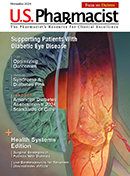US Pharm. 2021;46(7):1.
In a study published online on June 8 in the journal Immunity, a team led by researchers at University of California (UC) San Diego School of Medicine identified the molecular mechanism for the anti-inflammatory activity of the widely prescribed blood sugar–lowering diabetes drug metformin. In studies with mice, the scientists found that metformin prevents pulmonary or lung inflammation in animals infected with SARS-CoV-2.
Over the past year, several retrospective clinical studies had reported that metformin use by diabetic and obese patients prior to hospital admission for COVID-19 correlated to reduced severity and mortality. Diabetes and obesity are both recognized risk factors for COVID-19 and are linked to more severe outcomes. Interestingly, other medications used to control blood sugar levels do not appear to produce a similar effect.
These clinical studies suggested that metformin’s anti-inflammatory activity, rather than lowering of blood glucose, could be responsible for reduced COVID-19 severity and mortality; however, none of the studies offered an explanation or prompted large, randomized clinical trials needed for obtaining conclusive answers.
“The clinical studies were plagued by confounders that made conclusions hard to reach. There was some skepticism in their findings,” said corresponding study author Michael Karin, PhD, distinguished professor of pharmacology and pathology and Ben and Wanda Hildyard Chair for Mitochondrial and Metabolic Diseases at UC San Diego School of Medicine.
Dr. Karin and co-author Elsa Sanchez-Lopez, PhD, an assistant professor at the Department of Orthopedic Surgery, Postdoctoral Fellow Hongxu Xian, PhD, and others turned their focus to a mouse model of acute respiratory distress syndrome (ARDS), a life-threatening condition in which fluids leak into the lungs, making breathing difficult and restricting oxygen supply to essential organs.
ARDS is triggered by trauma and by bacterial or viral infections. It is a frequent cause of death in patients hospitalized with COVID-19. The researchers found that metformin administered to mice prior to or after exposure to bacterial endotoxin, a surrogate for bacterial pneumonia, resulted in the inhibition of ARDS onset and lessening of its symptoms. Metformin also produced a marked reduction in mortality in endotoxin-challenged mice and inhibited interleukin 1 (IL-1) production.
IL-1 and IL-6 are small proteins called cytokines that cause inflammation as an early immune response. Their amounts are often highly elevated in persons infected by SARS-CoV-2, creating “cytokine storms” in which the body starts attacking its own cells and tissues.
The authors said the findings suggest metformin may have therapeutic potential for treating a variety of neurodegenerative and cardiovascular diseases in which NLRP3 inflammasome activation is a factor.






